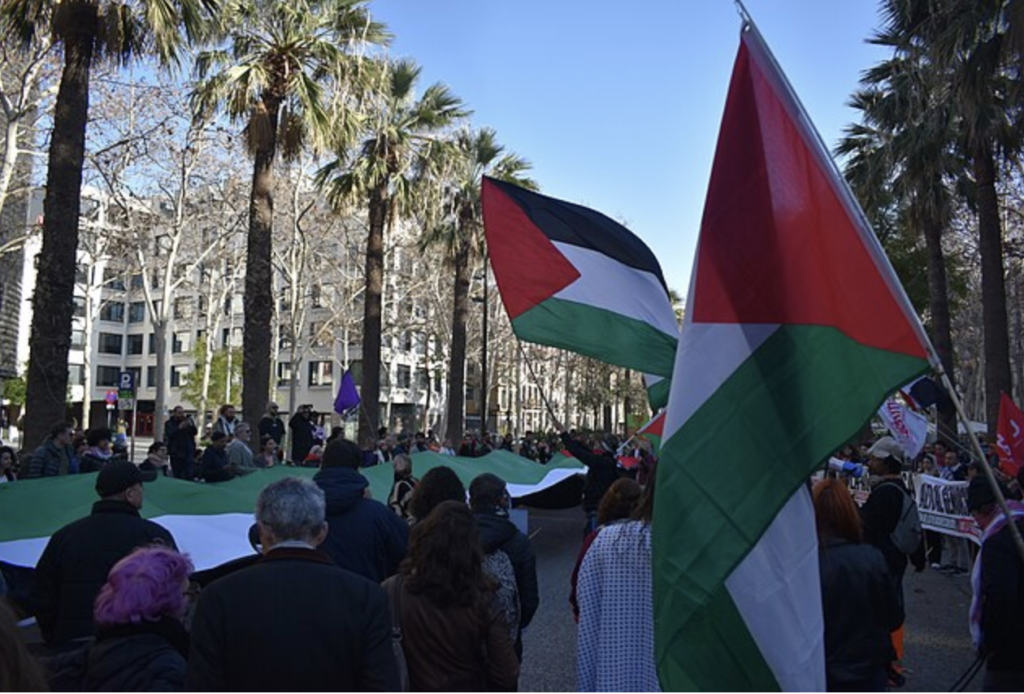A Binational Confederation for a Brighter Palestine and Israel Future

By: Ghassan Rubeiz / Arab America Contributing Writer
In Gaza, the toll of the killed, wounded, handicapped, diseased, starved, and displaced is over two million. Is it time for a ceasefire? When will the world react?
At the time of this writing, there is breaking news: the US proposes a draft resolution to the UN Security Council calling for a temporary ceasefire for the release of all hostages and an increase in humanitarian aid. The proposal contains a tacit warning from Washington to Israel: Washington opposes a planned invasion of Rafah. Rafah is the southernmost city in Gaza, where half the population of the enclave is sheltering in tents (Aol.com).
Over the weekend, I had the chance to discuss Gaza’s situation with an Israeli community organization psychologist. He is in DC for a short visit, including lunch in Silver Spring at a next-door neighbor’s home. Our Israeli visitor believes that deep, existential fear is at the roots of the ongoing Israeli, aggressive military campaign. Many in Israel believe that Palestinians want to “wipe Israel off the map,” our guest stated. The horrific events of October 7 were devastating, a “mind-altering experience”. As we delved into sharing impressions, it became clear that Palestinians have similar views of Israel’s intentions; they feel the Zionists have been planning for long to drive them out of their land through occupation, annexation, and ethnic cleansing.
The two-state solution
Given that both sides of the conflict share an apocalyptic view of the other, it is not easy to find an effective political solution. Neither a one-state solution nor a two-state scenario resonates with any side. Over the past century, the idea of separating Jews from Palestinians has taken several forms, starting with the 1917 Balfour Declaration, promising a home for the Jewish community in Palestine- which was under British mandate. The latest political formula for an Israel/Palestine separation is a two-state solution with modified borders. For the past three decades, successive attempts to make peace through the establishment of a Palestinian state have failed; they also have led to continued violence and instability. Ignoring realities, President Biden and some leaders of the Arab Gulf are discussing a two-state solution for postwar Gaza (The Washington Post).
The one-state solution
Prime Minister Netanyahu and his allies believe that if the two-state solution is unworkable, there is no better way than extending the occupation- by managing Palestinians’ resistance with force. Defending the status quo, some Israelis talk of a threatening single-state scenario: a hypothetical Palestinian state where Jews will inevitably become a minority. In such a state, all Diaspora Palestinians will return home, making it impossible for the Jewish population to maintain their presence, rights, and privileges. Such an overwhelming single-state scenario is not necessarily what Palestinians aspire for. Nevertheless, it is nearly impossible to convince Israelis that a non-Jewish, single state could guarantee a permanent balance of power between the two people- Jews and Palestinians.
Confederacy
Both sides reject the single-state solution because each expects the other to dominate. For a way out of this conceptual political deadlock, a binational confederation (of an Israeli nation and a Palestinian one) may be a workable alternative. Such a hybrid scenario allows the satisfaction of nationhood for the two sides. It would also enable partial ethnic separation and decentralization of governance within a shared system of law, security, defense, and the economy.
In a binational confederacy, Palestinians and Israelis would share a common border, a confederated government, and a unified army. In Haaretz, Dahlia Sheindlin discusses the merits of a hypothetical Israel-Palestine confederation: limited shared institutions, borders designed for freedom of movement subject to security needs, residency rights on the “other” side, and coordinating economic and security policy. It accepts the overlap of populations for both symbolic and pragmatic reasons rather than striving for ethno-national separation of Israelis from Palestinians (Haaretz).
Talking points for a confederacy
There are five basic ideas in the rationale of a binational Israel – Palestine confederacy: Mixing Arab and Jewish residents would facilitate attitude change; sharing economic and security benefits would reinforce cooperation across ethnic lines; the system would address the problem of refugees and Israeli settlers; an Arab-Jewish political entity would facilitate regional integration; in a culturally diverse, democratic confederacy, the interference of religious institutions in politics would be contained.
Attitude changes through personal exposure
Attitudes are more likely to change for the better with exposure to novel, positive experiences. A new socio-political environment, allowing daily interaction between the two societies, would improve trust across ethnic lines. Outside the territories of the occupation, within Israel’s 1948 borders, Palestinians and Jews are relatively integrated, albeit not equal.
There is a connection between the severity of separation and violence. In Israel proper, there is some degree of stability and prosperity. In contrast, the West Bank and East Jerusalem are constantly tense and violent; the occupation separates Palestinians from the Israeli community with checkpoints and other forms of harsh barriers. Where separation is complete, as in Gaza, full isolation has led to a genocidal war.
Ending wars through the separation of ethnic groups often results in carnage. A case in point: Dividing the Lebanese capital into “East and West Beirut”, fuelled the civil war for 15 years. Separating Pakistan from India and Greece from Turkey led to ethnic massacres. According to Sorbonne Professor Manlio Graziano, the two-state solution is a recipe for carnage. Graziano’s article would be good for President Biden (Foreign Policy).
Sharing security and prosperity
The bi-national model offers security for Palestinians and Israelis by giving defense a joint command. In contrast to the arrangement of the Oslo agreement, security for Palestinians and Israelis would be integrated to serve the interests of all. In the current system, the Palestinian Authority is viewed as serving mainly Israelis against Palestinian “rebels.” Security “for all” comes along with jobs, education, and service for all. When Israelis see the benefit of protection for Palestinians and, in turn, Palestinians have a vested interest in protecting Israelis, the system works as expected. The fact that Palestinians in Gaza and the West Bank were until recently willing to build houses for Israelis, even under conditions of an oppressive occupation, is telling. Economic security is vital for both sides. The economy of the new political system should encourage equity among Palestinians and Israelis. Israel’s modern economy needs Palestinian labor, and Palestinian workers need business opportunities to prosper. Extreme groups would not find fertile grounds to mobilize political resistance when access to resources is planned in the political system. In a free and prosperous Palestine, there is not much room for Hamas or Hamas-like organizations.
The system would accommodate Jewish settlers and Palestinian refugees
In a confederacy, Israel’s settlers would be encouraged, not forced, to relocate to Israel’s pre-1967 borders. They would come under the Palestinian political zone of authority if they choose to stay. Reciprocally, Palestinian refugees would have the chance to be repatriated in limited numbers; they would be allowed to visit or study in the confederacy. Some would be compensated in other ways. Moreover, if settlers were to stay, they would have to share some of their resources with their Palestinian neighbors, particularly water, jobs, and education.
Normalizing Israeli relations in the region
Despite the carnage in Gaza, there is still willingness in the Arab world -albeit at the leadership level- to negotiate regional peace. Assuming there is an agreement for a ceasefire in the near future, discussing the expansion of the Abraham Accords while Gaza is in ruins and the Palestinians are stateless would be out of the question. However, once Israel is confederated with a free Palestine, talk of normalization with Israel/Palestine becomes natural. Even Iran would no longer have strong allies to reject Arab decision-making once Palestinians achieve self-determination- through a confederacy with Israelis.
Ameliorating sectarian politics
Both Israelis and Palestinians are currently paralyzed by sectarian tension within their respective societies. The bi-national model, if successful, could gradually drive fear, hate, and anger from religion. A constitution allowing the freedom of conscience would bring back ecumenism to Judaism, Islam, and Arab Christianity. The new political system will not discourage religion; in contrast, it will support the practice of faith in a climate of freedom.
The bottom line is that the salvation of Palestine is in the salvation of Israel, and vice versa, politically and morally. There is no future for a fanatic state for either side. In the search for a solution for Palestine and Israel, we have naturally reached hopeful signs for a regional awakening.
What is needed first is a ceasefire in Gaza, then an international approach to rebuilding the enclave, and subsequently, a process of identifying a wider political horizon.
Israel is far from ready to consider the confederation model, but it is time to discuss this conciliatory path.
Ghassan Rubeiz is the former Middle East Secretary of the World Council of Churches. Earlier he taught psychology and social work in his country of birth, Lebanon, and later in the United States, where he currently lives. For the past twenty years, he has contributed to political commentary and delivered occasional public talks on subjects related to peace, justice, and interfaith. You can reach him at rubeizg@gmail.com
The views and opinions expressed in this article are those of the author and do not necessarily reflect the position of Arab America. The reproduction of this article is permissible with proper credit to Arab America and the author.
Check out our Blog here!



